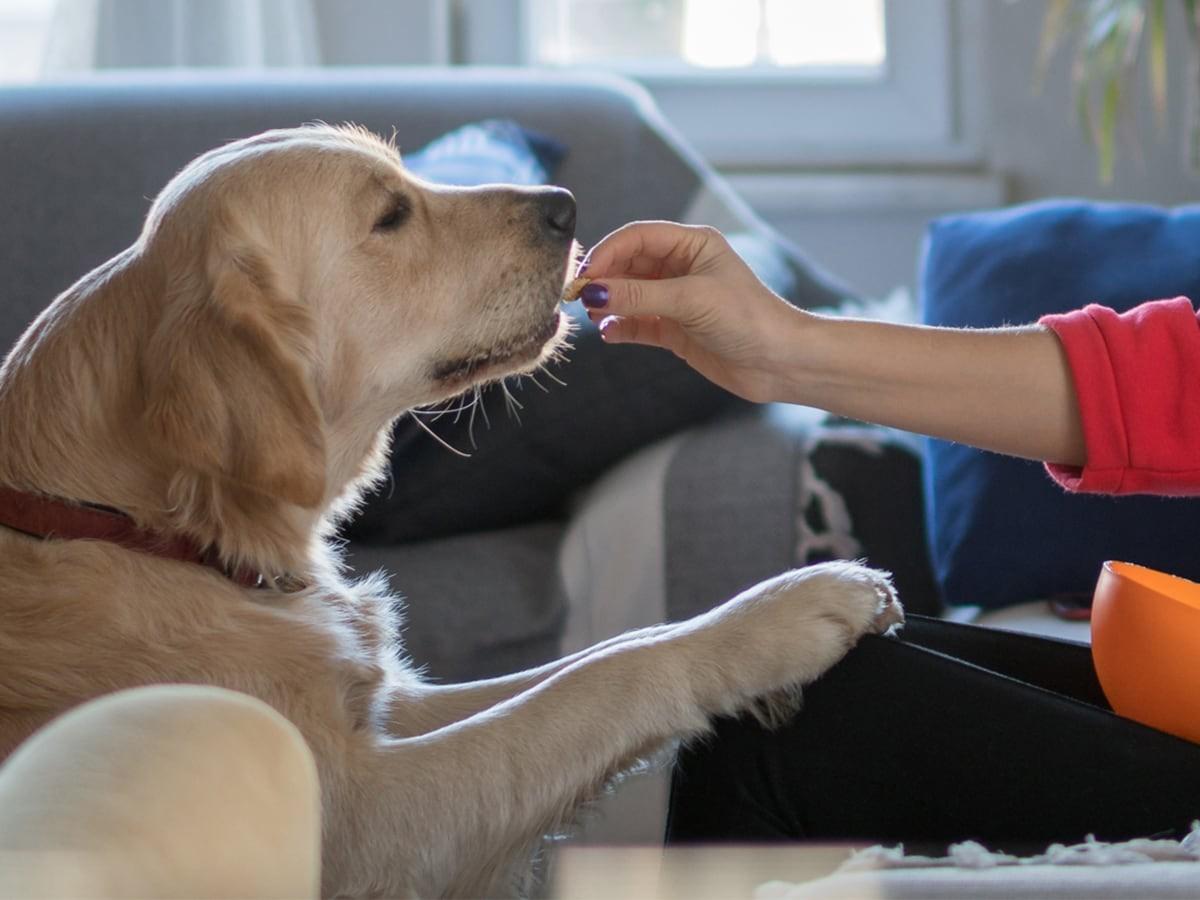Many people think of seeds as being just for birds, but the fact is that seeds can be a healthy part of a dog’s diet as well. Seeds are an excellent source of essential fatty acids, which can help to keep your dog’s coat and skin healthy. They are also a good source of protein, making them ideal for active or working dogs. Seeds can help to promote healthy digestion and can even be used as a natural remedy for upset stomachs. If you’re looking for a way to add some extra nutrition to your dog’s diet, seeds are worth considering.
Seeds That Are Safe for Dogs
Super seeds can be a great way to add some extra nutrients to your dog’s diet, but it’s important to make sure that you only feed seeds in moderation. The following seeds are generally considered safe for dogs to eat.
Can Dogs Eat Sunflower Seeds?
Yes, but only in moderation. Naturally occurring oils in sunflower seeds can irritate a dog’s pancreas. They may experience bubble guts or vomiting if they eat too many.4
Avoid giving dogs salted sunflower seeds. Too much salt can increase a dog’s risk of heart disease and sodium toxicosis. This condition is potentially fatal. Sodium toxicosis occurs when dogs consume too much salt. Symptoms of sodium toxicosis include vomiting, diarrhea, excessive thirst, lethargy, and muscle weakness.5 If you suspect your dog has eaten something they shouldn’t have, contact your veterinarian immediately. With prompt treatment, most dogs make a full recovery.
Tips to feed your dog sunflower seeds
Only serve unsalted seeds
Avoid seasoning
Toss shell hulls
Choose snack-size amounts
Can Dogs Eat Pumpkin Seeds?
Dogs can eat this fall favorite roasted or toasted. Turn pumpkin seeds into a crunchy treat by putting them in the oven for 20 minutes. Pumpkin seeds are loaded with fiber and a healthy dose of protein. Per ounce, pumpkin seeds contain 125 calories. They also have five grams of fat and protein, 15 grams of carbohydrates and five grams of dietary fiber. Rich in phosphorus, magnesium, copper, zinc, calcium, iron, and antioxidants, pumpkin seeds can also act as a natural de-wormer in dogs to get rid of tapeworms and other intestinal parasites.6
The Benefits:6
Can help dislodge kidney stones and possibly prevent them from reforming.
Make coats lush
Regulate digestion and prevent constipation
Protect against free-radical damage and oxidation in cells
Support bone strength and muscle health
Boost cognition
Help prevent UTI
Support red blood cell health
Adds bulk to stool
Grind up pumpkin seeds and sprinkle into your dog’s bowl. You can also bake or roast them if your dog has an upset stomach.
Can Dogs Eat Sesame Seeds?
Rich in phosphorous, manganese, calcium, and selenium, sesame seeds can help dogs with constipation and cracked paws in oil form. You might worry if dogs can eat sesame seeds in excess. No worries! The calcium in sesame seeds helps bones while the copper supports joints.7
Can Dogs Eat Chia Seeds?
As a superfood for humans and dogs, chia seeds are rich in fiber, protein and nutrients. The fiber helps regulate blood sugar and slows digestion. Plant protein in chia seeds can help in weight loss. These super seeds contain calcium, potassium, magnesium, manganese, zinc, and phosphorus for advanced nutrition for your dog.8
Seeds to Avoid Giving Your Dog
While many seeds are safe, some are highly toxic and should never be given to your dog.
Can dogs eat mustard seeds?
Absolutely not! Mustard seeds are highly toxic for dogs. Avoid homemade mustard, wild mustard, English mustard, Dijon mustard, honey mustard, yellow mustard, and mustard powder. Toxic compounds in mustard seeds can cause loss of appetite, drooling, vomiting, abdominal pain and diarrhea.3
Can Dogs Eat Poppy Seeds?
The short answer is no, they can’t. Poppy seeds are toxic to dogs and can cause serious health problems. The problem with poppy seeds is that they contain a chemical called opiates. When these seeds are ingested by dogs, the opiates can cause sedation, vomiting, and diarrhea. In severe cases, poppy seed toxicity can lead to coma and death.9 Make sure to keep those pesky poppy seeds away from your furry friend!
Can Dogs Eat Apple Seeds?
Apple seeds are toxic to dogs. The seeds contain a compound called amygdalin, which can break down into cyanide when digested. This can cause symptoms such as difficulty breathing, vomiting, and diarrhea. If left untreated, amygdalin poisoning can be fatal. Luckily, it takes quite a few seeds to cause serious harm, so there’s no need to worry if your dog takes a nibble of your apple.10 Just be sure to remove the seeds before giving them a treat.
Expert Insights from Spot
While sharing our favorite foods with our pets can be tempting, it's important to remember that not all human foods are safe for dogs. Spot's internal data shows that pet insurance claims for dietary indiscretions average $642*, highlighting the importance of caution and research before sharing snacks with your pet.
Key Takeaway
It’s no secret that dogs love a good treat. Seeds can make a great snack for your furry friend. However, not all seeds are created equal when it comes to your dog’s health. Although most seeds are perfectly safe for your pup to enjoy, there are a few that you’ll want to avoid. Poppy and apple seeds, for example, can be toxic to dogs if consumed in large quantities. If you’re looking to give your dog a seed-based treat, be sure to do your research first. Otherwise, you may end up doing more harm than good.

I've had the privilege of immersing myself in the realm of pet safety. As the owner of an energetic mini golden doodle, I know just how stressful being a pet owner can be. I am dedicated to ensuring our beloved pets enjoy a life brimming with good health.
*Jan 2019 to Aug 2024 Spot Pet Insurance Services, LLC claims data.
Dr. Beth Turner. “Safe and Unsafe Nuts and Seeds for Dogs & Cats.” Preventivevet.com, Preventive Vet, 2 Aug. 2024, www.preventivevet.com/pets/safe-and-unsafe-nuts-and-seeds-for-pets.
“Can Dogs Eat Seeds?” Butternutbox, 4 Oct. 2023, butternutbox.com/blog/can-dogs-eat-seeds. “Can Dogs Have Mustard? What to Do If Your Dog Eats Mustard - 2024.” MasterClass, 22 March 2022, www.masterclass.com/articles/can-dogs-have-mustard.
Reisen, Jan. “Can Dogs Eat Sunflower Seeds?” American Kennel Club, 27 Oct. 2022, www.akc.org/expert-advice/nutrition/can-dogs-eat-sunflower-seeds.
“Salt Toxicosis in Animals - Toxicology.” Merck Veterinary Manual, May 2022, www.merckvetmanual.com/toxicology/salt-toxicosis/salt-toxicosis-in-animals.
“9 Benefits of Pumpkin and Pumpkin Seed for Pets.” Vetnique Labs, Oct. 2022, www.vetniquelabs.com/blogs/vets-corner/8-benefits-of-pumpkin-seeds-for-pets.
“Can Dogs Eat Sesame Seeds? - 2024.” MasterClass, 16 March 2022, www.masterclass.com/articles/can-dogs-eat-sesame-seeds.
“Can Dogs Eat Chia Seeds? Potential Benefits and Hazards - 2024.” MasterClass, 22 March 2022, www.masterclass.com/articles/can-dogs-eat-chia-seeds.
“Can Dogs Eat Poppy Seeds? - 2024.” MasterClass, 21 June 2022, www.masterclass.com/articles/can-dogs-eat-poppy-seeds.
Joy, Hector. “Can Dogs Eat Apples?” PetMD, 25 Sep. 2025, www.petmd.com/dog/nutrition/can-dogs-eat-apples.
The information presented in this article is for educational and informational purposes only and does not constitute or substitute for the advice of your veterinarian.












